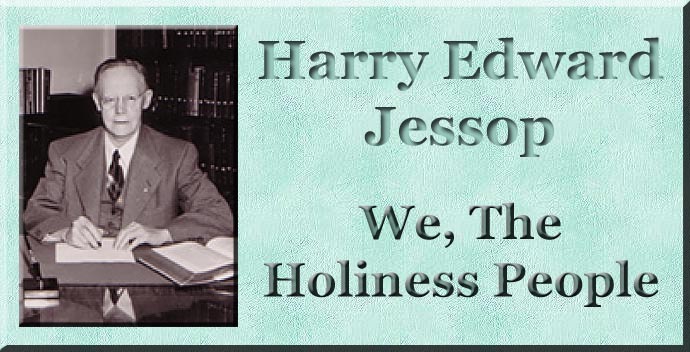
We, The Holiness People
By Harry E. Jessop
Part One
Who are the Holiness People?
Chapter 3
THE HOLINESS PEOPLE HAVE A GRAND OPPORTUNITY"Whether it be right in the sight of God to hearken unto you more than unto God, judge ye. For we cannot but speak the things we have seen and heard." Acts 4:19, 20. The future of the Holiness People will depend entirely upon their loyalty to this central truth which God has raised them up to declare. From the earliest days it would seem that God has found it necessary to keep this truth alive by what might be termed the "out of" method. When we say this, we are holding no brief for carnal schisms. God only knows how badly the Church has been rent and torn, and how weak she has become by reason of her divisions. None but He will ever know the heartaches and the heartbreaks which have been endured where men have been made offenders for a word and unchurched for a declared conviction. Yet, down through the centuries, it has been through experiences such as these that the Church has been perpetuated; in fact this thought is expressed in her very name: she is the Church; the Ecclesia; the called out. The Church's early history as seen in the record of the Book of Acts is the Holy Spirit's testimony to the Church's desire to avoid this "out of" experience. In her beginnings she did her utmost to remain within the Jewish pale. Wherever they went, her early preachers made it a matter of principle to begin their witness in the Jewish synagogue. It was only when driven out that they came out. They then found it necessary to preserve their work by the formation of small communities which they called Churches, these being recognized as local expressions of the one Church. As the age has worn on, this same thing has happened again and again within the Church itself. In every period of declension there has been a saving remnant, the members of which, not of their own choice but out of sheer necessity, have been compelled to take their stand without the camp bearing reproach in order that the truth which they conceived to have been committed to them as a sacred trust might continue to live. Martin Luther was such an one, declaring to a decadent Church and a stupefied world, "The just shall live by faith." The authorities of the Church cast him out and out he came. The Wesleys were men of this breed. Who has not been thrilled by the picture of John Wesley, at Epworth, climbing on to that table-like tomb, and from his strange elevation, proclaiming salvation to a needy world? Shut out from his father's church, that closed door became the birthplace of a mighty movement which has girdled the globe. Cast out, he came out. Who also, with any soul at all within him, has not felt a warming of heart as he has read the story of William and Catherine Booth? Refusing to be bound by conventional ties in their ministry for the lost, they marched out of that Conference Chamber to London's bleak Mile End Waste and started currents of salvation which have flowed to every part of the world. The closing door of that waning church became their marching orders. They came out, not to criticize, sulk and pout, but to strike hard at evil and to do exploits for God. The Holiness Movement began not as a movement away from the Churches, but very definitely within them. It would be better to say that the Church in its beginning was a "holiness movement." No right-minded person would want just to start another Movement, yet some have been compelled to do so. The Holiness Movement is not a new Church; it is the undying expression of an old truth which must survive, no matter what may happen to the Churches. Like the new wine of which Jesus spoke, it may burst the old wine skins if they rigidly and determinedly oppose its working, but God will always see to it that there are vehicles at hand for its further expression. The truth of Scriptural Holiness cannot die. Holiness is a spiritual force which, when allowed to work, will work within the Churches already established; but where it is hindered and thwarted it will of necessity cut out its own channels along which to flow. That is exactly what it seems to be doing in our day, as some younger and newer Holiness Churches make such enviable progress. There are many things about these churches which, to more conservative minds, may not always appeal. They are yet in their ecclesiastical youth, and doubtless they have much to learn, but they are at least alive and vital, a fact which commands men's attention when from the more formal churches they would turn away. The greatest danger of these younger churches seems to be the temptation to push outward without giving themselves enough time to strike downward. They seem to forget that all attempted fruit requires a corresponding root. Sheer necessity, however, must sooner or later, drive them deeper down. They, in their turn, must either deepen or die. |
|
 |
 |
|
|
|
-
Site Navigation
 Home
Home What's New
What's New Bible
Bible Photos
Photos Hiking
Hiking E-Books
E-Books Genealogy
Genealogy Profile
Free Plug-ins You May Need
Profile
Free Plug-ins You May Need
 Get Java
Get Java.png) Get Flash
Get Flash Get 7-Zip
Get 7-Zip Get Acrobat Reader
Get Acrobat Reader Get TheWORD
Get TheWORD